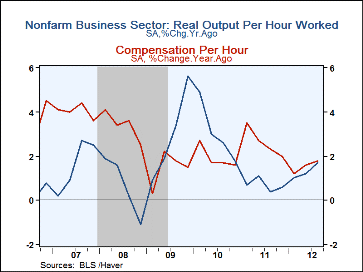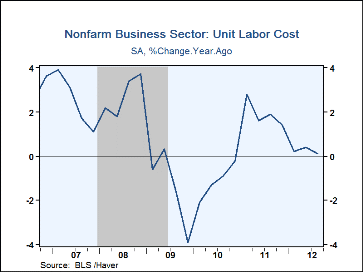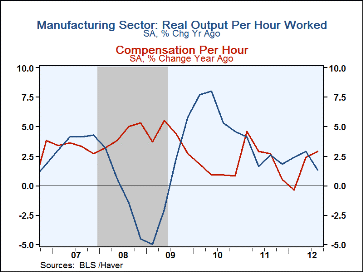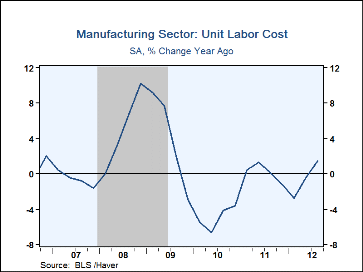 Global| Dec 05 2012
Global| Dec 05 2012U.S. Productivity Growth Improves & Lowers Unit Labor Costs
by:Tom Moeller
|in:Economy in Brief
Summary
Nonfarm business sector productivity for Q3'12 was revised up to 2.9% (1.7% y/y) from last month's estimate of a 1.9% gain which matched the Q2 rise. Growth was its fastest in two years. The latest increase reflected a 4.2% (3.5% y/y) [...]
Nonfarm business sector productivity for Q3'12 was revised up to 2.9% (1.7% y/y) from last month's estimate of a 1.9% gain which matched the Q2 rise. Growth was its fastest in two years. The latest increase reflected a 4.2% (3.5% y/y) gain in output and a 1.3% (1.8% y/y) rise in hours worked. The increases were accompanied by a 0.9% (1.8% y/y) rise in compensation. A a result of this faster gain in productivity and a slower rise in compensation, unit labor costs fell at a 1.9% (+1.5% y/y) annual rate.
In the factory sector, the picture was not as constructive. Productivity fell at a 0.7% (+1.3% y/y) rate as the 0.7% (4.0% y/y) decline in output was accompanied by no change (2.6% y/y) in hours worked. Since compensation rose at a 2.4% (2.9% y/y) rate, unit labor costs rose at a 3.2% (1.5% y/y) rate. That gain was the quickest in three years and helped erode corporate profitability.
The productivity & cost figures are available in Haver's USECON database.
| Productivity & Costs (SAAR,%) | Q3'12 | Q2'12 | Q1'12 | Q3 Y/Y | 2011 | 2010 | 2009 |
|---|---|---|---|---|---|---|---|
| Nonfarm Business Sector | |||||||
| Output per Hour (Productivity) | 2.9 | 1.9 | -0.5 | 1.7 | 0.7 | 3.1 | 2.9 |
| Compensation per Hour | 0.9 | 1.3 | 5.8 | 1.8 | 2.7 | 2.0 | 1.4 |
| Unit Labor Costs | -1.9 | -0.5 | 6.4 | 0.1 | 2.0 | -1.0 | -1.5 |
| Manufacturing Sector | |||||||
| Output per Hour | -0.7 | -0.1 | 5.5 | 1.3 | 2.5 | 6.4 | 0.1 |
| Compensation per Hour | 2.4 | 9.0 | 6.7 | 2.9 | 2.6 | 1.1 | 4.1 |
| Unit Labor Costs | 3.2 | 9.0 | 1.1 | 1.5 | 0.1 | -5.0 | 4.0 |
Tom Moeller
AuthorMore in Author Profile »Prior to joining Haver Analytics in 2000, Mr. Moeller worked as the Economist at Chancellor Capital Management from 1985 to 1999. There, he developed comprehensive economic forecasts and interpreted economic data for equity and fixed income portfolio managers. Also at Chancellor, Mr. Moeller worked as an equity analyst and was responsible for researching and rating companies in the economically sensitive automobile and housing industries for investment in Chancellor’s equity portfolio. Prior to joining Chancellor, Mr. Moeller was an Economist at Citibank from 1979 to 1984. He also analyzed pricing behavior in the metals industry for the Council on Wage and Price Stability in Washington, D.C. In 1999, Mr. Moeller received the award for most accurate forecast from the Forecasters' Club of New York. From 1990 to 1992 he was President of the New York Association for Business Economists. Mr. Moeller earned an M.B.A. in Finance from Fordham University, where he graduated in 1987. He holds a Bachelor of Arts in Economics from George Washington University.










